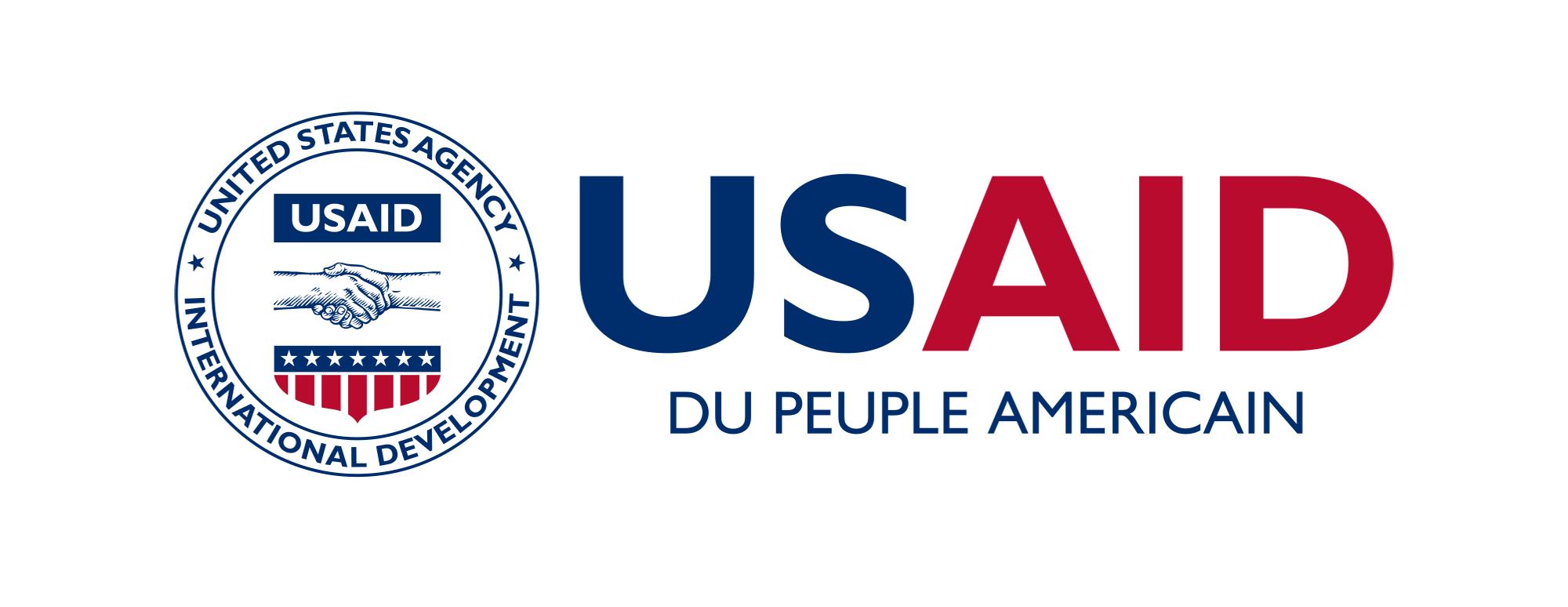Five Co-investment Partners successfully Closed-out their Trade Hub funded Partnerships
The USAID-funded West Africa Trade & Investment Hub (Trade Hub) is one of the largest blended finance mechanisms in the world, working with the private sector to bolster economic growth in the region. The 5-year $116 million trade and investment facilitation Activity has, to date, awarded $83.6 million in co-investment grants directly to 92 private sector businesses across 16 West African countries, helping them to mobilize additional injections of local and foreign investments into their enterprises to scale and accelerate their businesses, create employment opportunities, and increase trade and exports. Increasing their economic activity, productivity, and incomes further contributes to improving food security, addressing climate change challenges, and promoting social inclusion and employment in their respective countries and communities.
In this light, the Trade Hub awarded a total co-investment grant of $3,739,132 among five grantees: Premier Seeds, Thrive Agric, and Babban Gona in Nigeria, and Entreprise Aïssatou Gaye in Senegal to tackle smallholder farmer challenges and address food insecurity, and to Global Mamas in Ghana as part of its COVID-19 Rapid Response, to ensure Global Mamas smooth operations during the COVID-19 pandemic. This grant amount catalyzed $52.44 million in new private-sector investments.
In 2023, these five Trade Hub activities closed out successfully. With a vested interest in various aspects of food security, climate finance, social inclusion, agri-business competitiveness, and export, these co-investment partnerships have shown significant leaps and have successfully unlocked millions of dollars into their countries’ economies, contributed to economic growth in their respective countries and the region at large and created thousands of employment opportunities including for women and youth.
Producing Drought-Resistant Seeds to Impact Farmer’s Yield in Nigeria
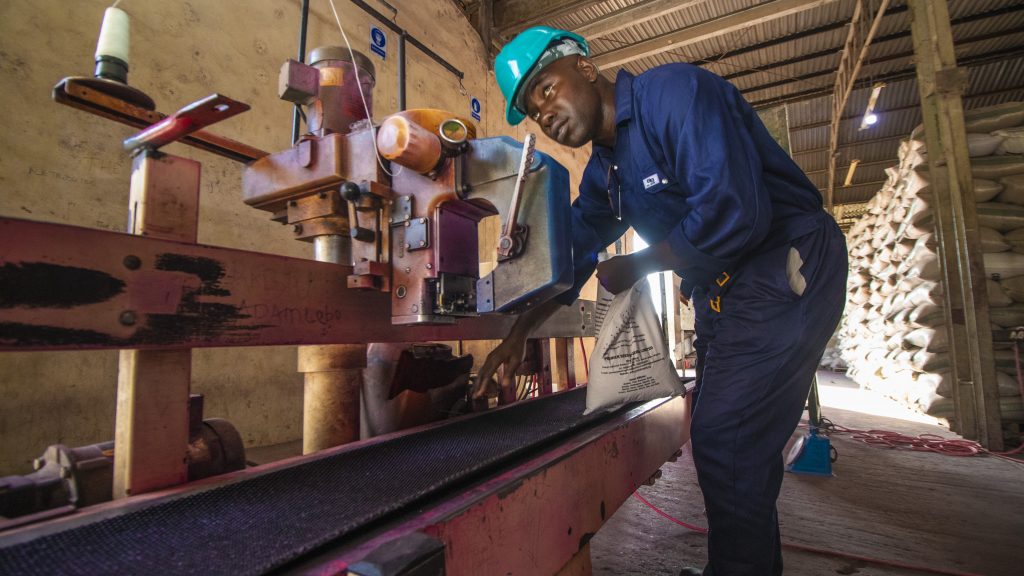
Photo Caption Inside view of a warehouse at Premier Seeds Company. Photo credit: Premier Seeds
With a co-investment grant of $394,236 (149 million Naira) Premier Seeds, supported 750 seed producers (outgrowers) who produced over 3,200 metric tons (MT) of high-yielding certified seeds in Nigeria. Within the 20 months of the partnership with Premier Seeds, 1,108 new jobs were created of which 253 were created for women and 742 for youth, and a total of 3,204 MT of the different crop varieties enough to plant over 100,000 hectares were sold and dispersed to about 31,420 smallholder farmers across 7 states in Nigeria (Benue, Cross River, Delta, Ebonyi, Niger, Kaduna, and Kebbi States). The survey conducted at the end of the season revealed that farmers who adopted the seeds achieved increased yields by over 100%.
The project also achieved some remarkable results, they multiplied 8 new varieties of seeds, reached 4,787 participants, achieved sales of $4.3 million, and successfully mobilized $616,603 in private-sector investment. Premier Seeds plans to continue operations in the operational states, especially the states that achieved higher sales. Given its success, Premier Seeds plans to expand into other West African countries and institutionalize the company’s Commission Agent’s strategy, deployed during the project which helped them to meet and exceed sales targets.
Leveraging Agri-tech to Reach 50,000 Smallholder Farmers in Nigeria
The Trade Hub awarded a $1.9 million co-investment grant in March 2021 to Thrive Agric to strengthen the capacity of 50,000 smallholder farmers in Nigeria’s Kaduna, Kebbi, and Kano States to produce maize, rice, and soybean for domestic and global markets. Through this partnership with the Trade Hub, Thrive Agric made sustainable gains in its efforts to reach smallholder farmers. With its innovative Agricultural Operating System (AOS) App, the company was able to operate and monitor the agricultural practices of its registered farmers which led to an increase in farm productivity and profitability; a decrease in yield loss, and wastage, and enabled accessibility to accurate data on crop and soil health, and weather forecast.
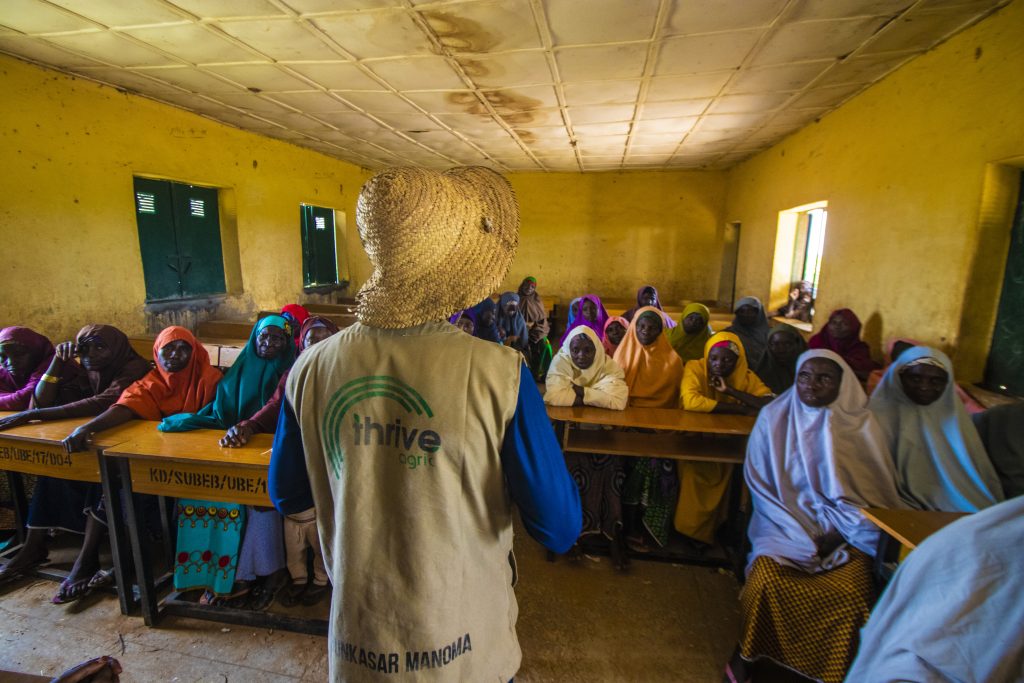
A Thrive Agric field agent facilitating a GAP Training for a group of women farmers. Photo credit: Trade Hub
Through this device, Thrive Agric was able to manage what goes on in the farms, from the moment a ridge is built to harvesting and storage of the produce. As at the end of its activity in January 2023, Thrive Agric had reached 36,065 smallholder farmers (35 percent youth, 15 percent women) with access to credit, agronomy advisory services, and pre-and post-harvest storage and logistics support to enable them to improve their yields. The company invested $15.34 million of private sector investment, which is 53 percent more than the initial target of $10 million and created 1,178 sustainable jobs. Thrive Agric successfully provided financing access to 68,950 farmers, 37.9 percent more than the initial target of 50,000.
Bolstering the Capacity of Smallholder Farmers to Produce Maize and Rice and Preserve
the Quality of Harvested Grains
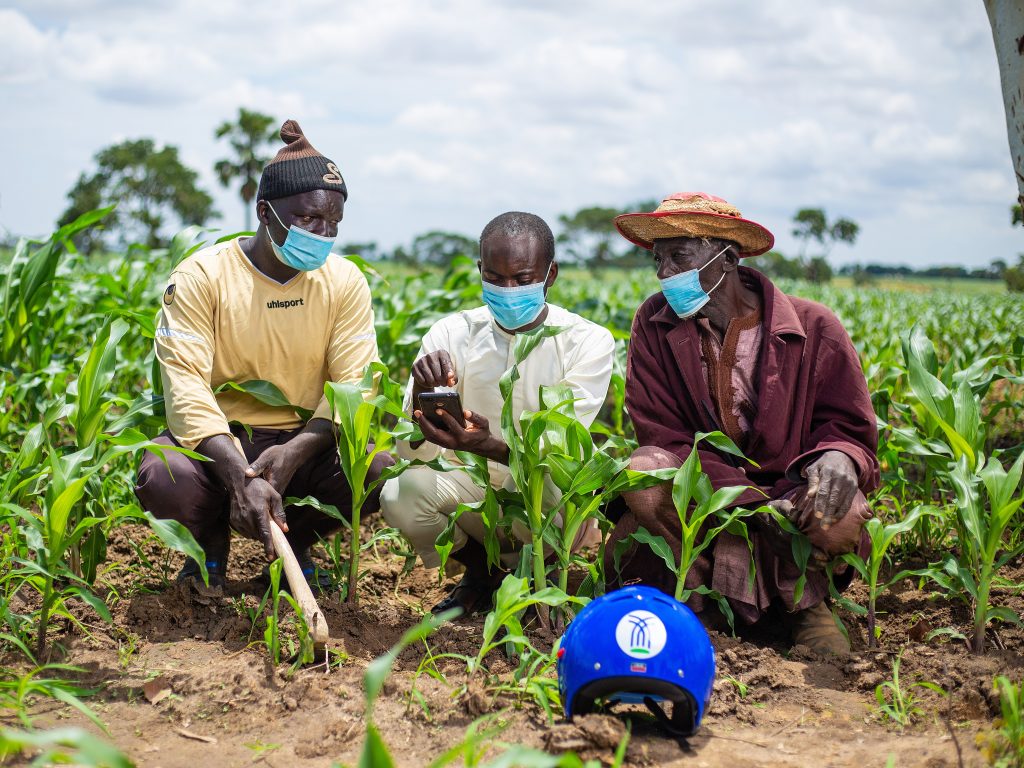
A staff of Babban Gona capturing farmers data for effective monitoring and supervision of their farm lands. Photo credit: Babban Gona
With a Trade Hub co-investment grant of $500,000, the Babban Gona project supported 66,562 farmers to cultivate maize and rice, over the 20 months of its implementation. The company also introduced GrainPro Coccon, a gastight and watertight storage solution that effectively eliminates insects and inhibits fungal growth to safely preserve the quality and quantity of maize of smallholder farmers in northern Nigeria to reduce food losses and ensure high-quality maize that fetches for better prices in the market. Under the Trade Hub partnership, Babban Gona procured 193 coccons in the course of the project implementation. The company also reached over 150,000 women with training on business and financial literacy, focused on poultry farming, and supported 13,400women with start-up packages to start small-scale poultry businesses. Additionally, these smallholder farmers accessed over $35 millionin agriculture-related financing while over 44,900 hectares (ha) were cultivated using best agronomic practices and improved technology. The company also ensured quality preservation of over 140,000 MT of grains to reduce post-harvest losses.
Bolstering Rice Production and Improving Food Security in Senegal
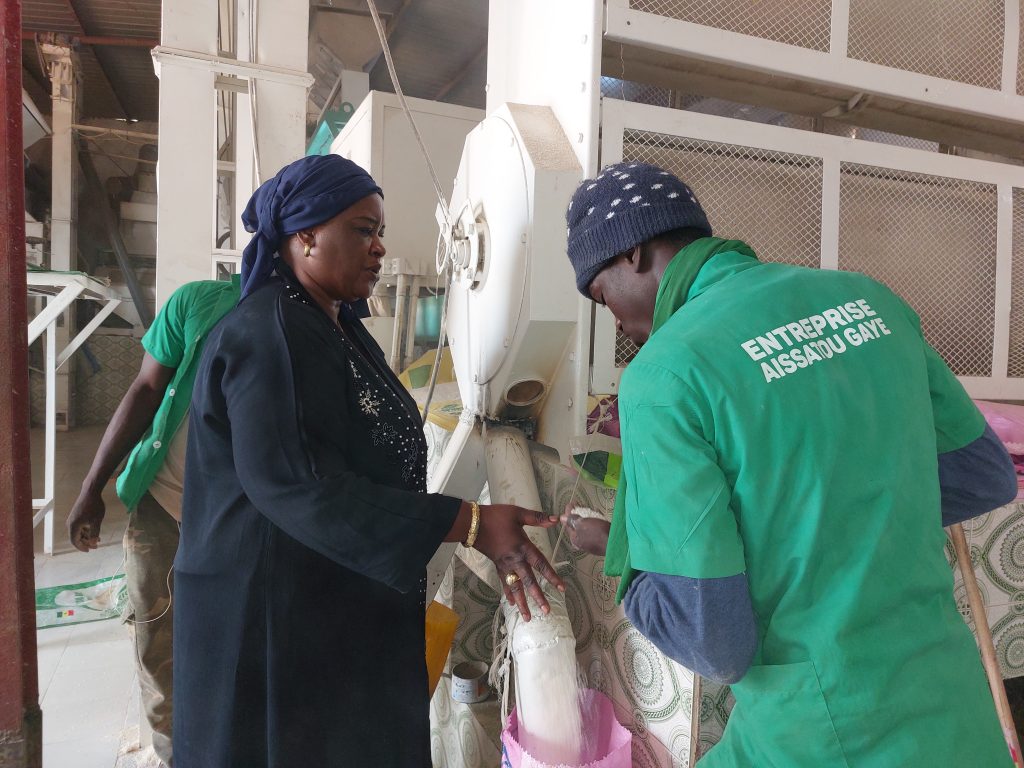
Managing Director, Aissatou Gaye and staff, sampling some of the processed rice before bagging. Photo credit: Trade Hub
Entreprise Aïssatou Gaye (EAG) is a woman-owned rice processing company founded in 2008 in the Ross-Béthio region. With a personal investment of approximately $300, Ms. Aïssatou Gaye began buying and selling white rice. Faced with growing demand and thanks to a first loan from the Caisse Nationale de Crédit Agricole du Senegal, now, La Banque Agricole (LBA), EAG set up an artisanal rice mill to transform paddy rice into white rice. By 2020, the year before being awarded a Trade Hub co-investment grant, EAG generated annual revenue of approximately $1.6 million.
The Trade Hub co-investment grant allowed EAG to access $7.23 million in working capital and asset financing from LBA. With the added cashflow flexibility, EAG acquired and installed a new efficient 4 MT/hour mill. Additionally, it enabled the procurement of a tractor and combine harvester that has been useful in the timely preparation of soil and harvest, covering a total of 2,624 ha for 1,294 producers. EAG increased the number of its producers from 1,452 to 2,961 and the rice area under cultivation from 1,468 ha to 2,924 ha, while 10,810 MT in paddy were collected per year against 6,640 MT prior to the Trade Hub partnership. The grant also aided EAG in facilitating access to $638,187 for 1,437 new producers who may never have received loans from LBA.
Pioneering the apparel business in Africa
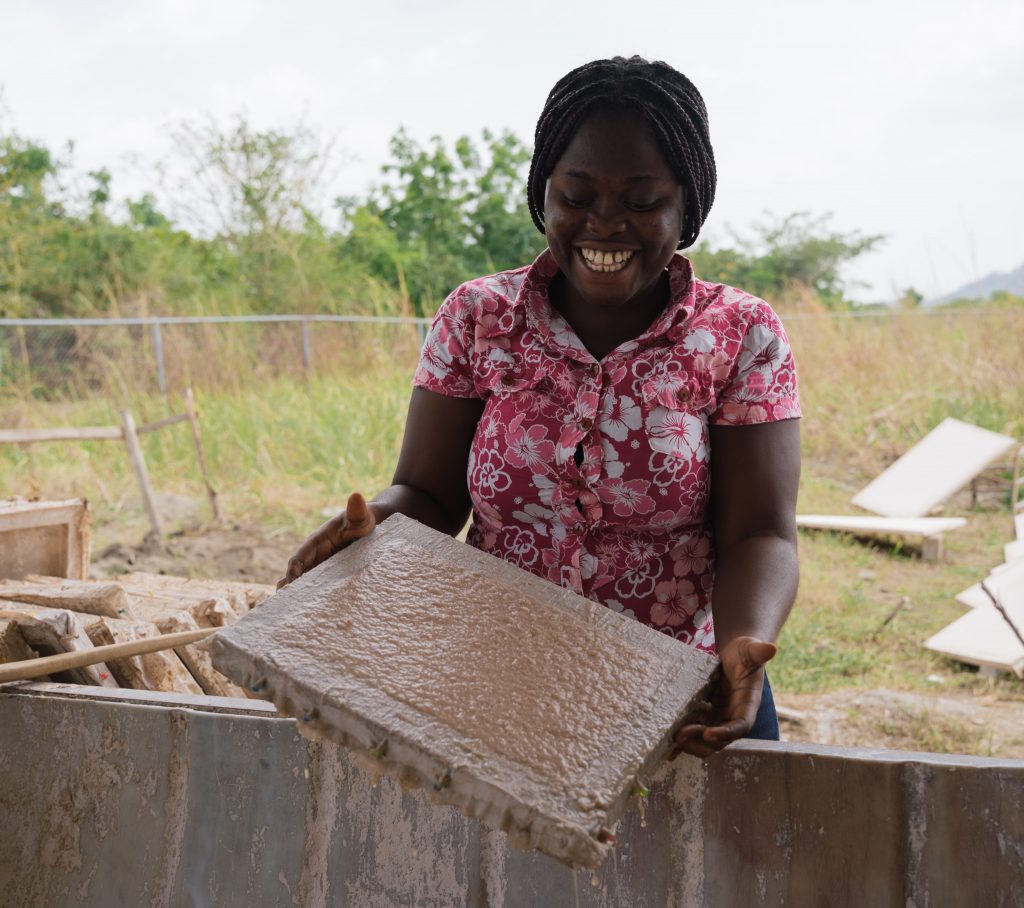
Global Mamas transforms leftover water hyacinth stalks from the weaving department into water hyacinth paper. Photo Credit: Trade Hub
The $497,112 co-investment grant awarded to Global Mamas in March 2021, a Ghana-based company, was critical to its survival through the COVID-19 pandemic, especially at a time when its sales had decreased by more than 60 percent and companies in the same or similar industries were cutting jobs to keep their factories open. At the grant’s end on February 28, 2023, Global Mamas had generated $1.64 million in exports (of which $1 million was to the United States) and $312,461 in local sales, mobilizing $2.25 million. The company sustained 267 jobs and created 91 new jobs, and began production on a new jersey knits line and a skincare line thus diversifying its product offerings to improve sales revenue and create employment opportunities.
As part of the localization drive of USAID, the Trade Hub continues to strengthen the capacity of similar businesses across Africa, offering economic, health, and agricultural-related solutions to businesses to become self-sufficient, create more jobs, become financially buoyant, and expand their scope. With the successful close-out of these grants, the Nigerian companies are already breaking barriers and starting up new operations in other African countries as offshoots of their co-investment partnerships with the Trade Hub. For Thrive Agric, there is no taking the foot off the pedal as they plan to establish a presence in Ghana, Tanzania, and Zimbabwe, with a target of reaching over 10 million farmers across Africa within the next seven years.
Premier Seeds has also expanded its activities into Ghana and Kenya and currently has a subsidiary company in the Benin Republic, while Babban Gona now operates across 11 states in Nigeria with Cross River being the latest addition to the list where the company also piloted its rice production. Global Mamas plans to maintain its staff, mostly women, and provide them with hands-on training to refine their skills, strengthen their capacity to produce better products and manage their personal incomes. In keeping with their efforts to be a fully circular manufacturing hub, they plan to integrate sustainable systems such as rainwater harvesting, greywater recycling, and treatment, and biogas and solar energy production. EAG plans to focus on scaling up its rice value chain in Senegal by acquiring more hectares for rice production, hiring additional staff, and maintaining its current workforce
